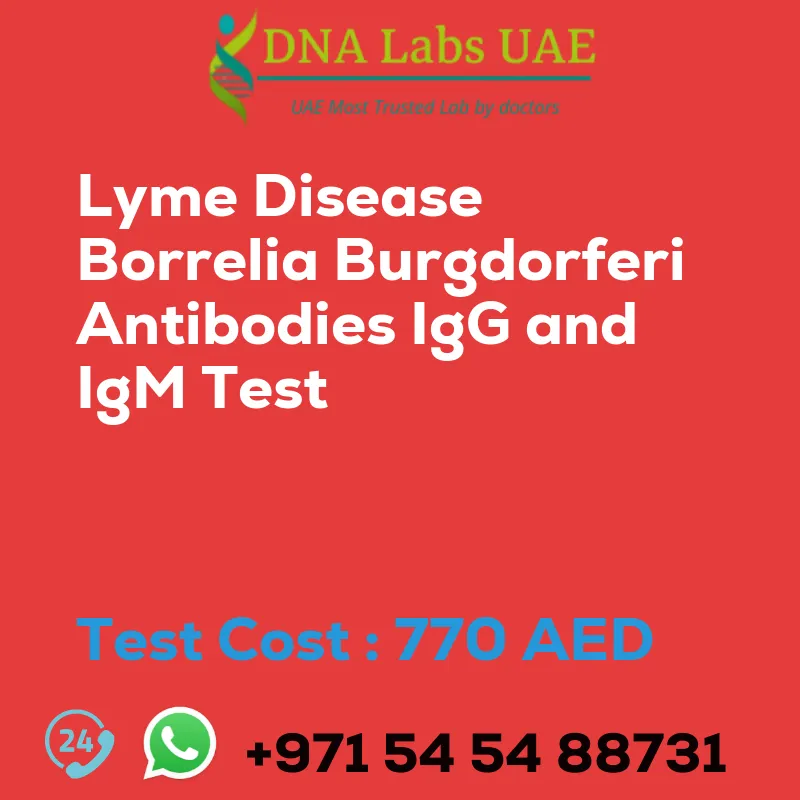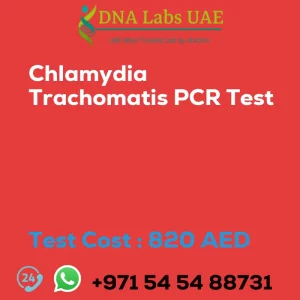LYME DISEASE BORRELIA BURGDORFERI ANTIBODIES IgG and IgM Test
Test Name: LYME DISEASE BORRELIA BURGDORFERI ANTIBODIES IgG and IgM Test
Components: IgG and IgM antibodies
Price: 770.0 AED
Sample Condition: 2 mL (1 mL min.) serum from 1 SST. Ship refrigerated or frozen.
Report Delivery: Sample received by Friday 6 pm; Report delivered next day
Method: Enzyme Immunoassay
Test Type: Infections
Doctor: Physician
Test Department:
Pre Test Information: No special preparation required
Test Details
The Lyme disease antibodies IgG and IgM test is used to detect the presence of antibodies against the bacterium Borrelia burgdorferi, which causes Lyme disease. IgG and IgM are two types of antibodies produced by the immune system in response to an infection.
IgM antibodies are the first to be produced in response to an infection and are typically detectable within a few weeks of infection. IgG antibodies are produced later in the infection and can persist for months to years after the initial infection.
The test involves taking a blood sample and measuring the levels of IgG and IgM antibodies specific to Borrelia burgdorferi. A positive result for either IgG or IgM antibodies suggests a current or recent infection with Lyme disease.
It is important to note that a positive test result does not necessarily mean that the individual has an active infection, as the antibodies can persist even after the infection has been successfully treated. Further testing and evaluation by a healthcare professional may be needed to confirm an active infection and determine the appropriate course of treatment.
| Test Name | LYME DISEASE BORRELIA BURGDORFERI ANTIBODIES IgG and IgM Test |
|---|---|
| Components | |
| Price | 770.0 AED |
| Sample Condition | 2 mL (1 mL min.) serum from 1 SST. Ship refrigerated or frozen. |
| Report Delivery | Sample Fri by 6 pm; Report Next day |
| Method | Enzyme Immunoassay |
| Test type | Infections |
| Doctor | Physician |
| Test Department: | |
| Pre Test Information | No special preparation required |
| Test Details |
The Lyme disease antibodies IgG and IgM test is used to detect the presence of antibodies against the bacterium Borrelia burgdorferi, which causes Lyme disease. IgG and IgM are two types of antibodies produced by the immune system in response to an infection. IgM antibodies are the first to be produced in response to an infection and are typically detectable within a few weeks of infection. IgG antibodies are produced later in the infection and can persist for months to years after the initial infection. The test involves taking a blood sample and measuring the levels of IgG and IgM antibodies specific to Borrelia burgdorferi. A positive result for either IgG or IgM antibodies suggests a current or recent infection with Lyme disease. It is important to note that a positive test result does not necessarily mean that the individual has an active infection, as the antibodies can persist even after the infection has been successfully treated. Further testing and evaluation by a healthcare professional may be needed to confirm an active infection and determine the appropriate course of treatment. |








